Annotations for Venetia, Georgette Heyer
Annotations for Venetia by Georgette Heyer
(published 1958)
Compiled by Heather-Joy Garrett
December 2008

The first recorded use of the name Venetia is Venetia Stanley. Born 1600 and died 1633 mentioned amongst other places by John Aubrey in his ‘Brief Lives’ and reported in full below:
Venetia Digby
Venetia Stanley was daughter of Sir Edward Stanley. She was a most beautiful desirable creature, and being of a mature age was let by her father to live with a tenant and servants at Eynsham Abbey* (his land , or the Earl of Derby’s) in Oxfordshire; but as private as that place was it seems her beauty could not lie hid. The young eagles had espied her, and she was sanguine and tractable, and of much suavity(which to abuse was great pity).
In those days Richard Earl of Dorset (grandson and heir to the Lord Treasurer) lived in the greatest splendour of any nobleman in England. Among other pleasures that he enjoyed, Venus was not the least.** This pretty creature’s fame quickly came to his lordship’s ears, who made no delay to catch at such an opportunity.
I have now forgotten who first brought her to town, but I have heard my uncle Danvers say (who was her contemporary) that she was so commonly courted, that it was written over her lodging one night in uncail letters,
Pray come not near,
For Dame Venetia lodgeth here.
The Earl of Dorset, aforesaid, was here greatest gallant, who was extremely enamoured of her, and had one if not more children by her. He settled on her an annuity of £500 per annum.*** ****

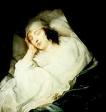 Among
other young sparks of that time, Sir Kenelm Digby grew acquainted
with her, and fell so much in love with her that he married her, much
against the goodwill of his mother: he would say ‘a wise man,
and lusty, could make an honest woman out of a brothel house.’
Sir Edmund Wyld had her picture (and you may imagine was very
familiar with her), which picture is now at Droitwich in
Worcestershire, at an inn, where now the town keep their meetings.
Also at Mr Rose’s, a jeweller in Henrietta Street in Covent
Garden, is an excellent piece of her, drawn after she was newly dead.
Among
other young sparks of that time, Sir Kenelm Digby grew acquainted
with her, and fell so much in love with her that he married her, much
against the goodwill of his mother: he would say ‘a wise man,
and lusty, could make an honest woman out of a brothel house.’
Sir Edmund Wyld had her picture (and you may imagine was very
familiar with her), which picture is now at Droitwich in
Worcestershire, at an inn, where now the town keep their meetings.
Also at Mr Rose’s, a jeweller in Henrietta Street in Covent
Garden, is an excellent piece of her, drawn after she was newly dead.
She had a most lovely and sweet-turned face, delicate dark brown hair. She had a perfect healthy constitution; strong; good skin; well proportioned; much inclining to a wanton (near altogether). Her face, a short oval; dark brown eyebrow, about which much sweetness, as also in the opening of her eyelids. The colour of her cheeks was just that of the damask rose, which is neither too hot or too pale. She was of just stature, not very tall.
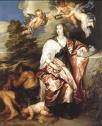 Sir
Kenelm had several pictures of her by Vandyke etc. He had her hands
cast in plaster, and her feet and her face. See Ben Jonson’s
second volume, where he had made her live in poetry, in his drawing
of her, both body and mind:
Sir
Kenelm had several pictures of her by Vandyke etc. He had her hands
cast in plaster, and her feet and her face. See Ben Jonson’s
second volume, where he had made her live in poetry, in his drawing
of her, both body and mind:
Sitting, and ready to be drawn,
What makes these tiffany, silks and lawn,
Embroideries, feathers, fringes, lace,
When every limb talks like a face! Etc
When these verses were made she had three children by Sir Kenelm, are there mentioned, viz Kenelm, George and John.
Her picture drawn by Sir Anthony Vandyke hangs in the queen’s drawing room, at Windsor Castle, over the chimney.
 She
died in her bed suddenly. Some suspected that she was poisoned.
When her head was opened there was found but little brain, which her
husband imputed to her drinking of viper wine; but spiteful women
would say it was a viper husband who was jealous of her, that she
would steal a leap. I have heard some say, - e.g. my cousin Elizabeth
Faulkner – that after her marriage she redeemed her honour by
her strict living. Once a year the Earl of Dorset invited her and Sir
Kenelm to dinner, where the earl would behold her with much passion,
and only kiss her hand.
She
died in her bed suddenly. Some suspected that she was poisoned.
When her head was opened there was found but little brain, which her
husband imputed to her drinking of viper wine; but spiteful women
would say it was a viper husband who was jealous of her, that she
would steal a leap. I have heard some say, - e.g. my cousin Elizabeth
Faulkner – that after her marriage she redeemed her honour by
her strict living. Once a year the Earl of Dorset invited her and Sir
Kenelm to dinner, where the earl would behold her with much passion,
and only kiss her hand.
Sir Kenelm erected to her memory a sumptuous and stately monument at Christ Church (near Newgate Street) in the east of the south aisle, where her body lies in a vault of brickwork, over which are three steps of black marble, on which was a stately altar of black marble with four inscriptions in copper gilt affixed to it: upon this altar her bust of copper guilt, all of which (except only the vault, which was only opened a little by the fall) is utterly destroyed by the great conflagration. Among the monuments in the book mentioned in Sir Kenelm Digby’s lif is to be seen a curious drawing of this monument with copies of the several inscriptions.
About 1676 0r 5, as I was walking through Newgate Street, I saw Dame Venetia’s bust standing at a stall at the Golden Cross, a brazier’s shop. I perfectly remember it, but the fire had got off the guilding: but taking notice of it to one was with me, I could never see it afterwards exposed to the street. They melted it down. How these curiosities would be quite forgotten, did not such idle fellows as I am put them down!
*At the west end of the church here were two towers as at Wells or Westminister Abbey, which were standing till about 1656. The rooms of the abbey were richly wainscoted both sides and roof.
** Samuel Daniel ‘Cloths of rose, locks of amber, To b’emprisioned in a chamber’ etc
***In fact probably his brother Edward, who succeeded him in the earldom in 1624 [Ed ‘Brief Lives]
**** After Sir Kenelm Digby married her [the £500] was unpaid by the earl; and for which annuity Sir Kenelm sued the earl, after marriage, and recovered it. – John Aubrey – Sir Kenelm Digby

Medea
Medea a celebrated magician, daughter of Aeates, king of Colchis. When Jason came to Colchis in quest of the golden fleece, he and Medea fell in love and were betrothed. On their return to Iolchos, Medea restored Jason’s father Aeson to youth by her magic. The daughters of Pelias, king of Iolchos, were also desirous to see their father rejuvenated, and, encouraged by Medea, who wished to revenge the injuries that her husband’s family had suffered from Pelias, they killed Pelias and boiled his flesh in a cauldron; but Medea refused to restore him. Driven in consequence from Iolchos, Jason and Medea fled to Corinth, where Jason deserted her for Glauce, the daughter of the king. Medea avenged herself by killing the two children she had had by Jason and destroying Glauce. She then married Aegeus, the father of Theseus, plotted to poison the latter for fear of his influence, and finally escaped to Asia. One of the tragedies of Euripes has Medea for its subject.
Note taken from ‘The Concise Oxford Dictionary of English Literature’ [CODEL]

The Corsair
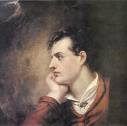
A poem in heroic couplets by Lord Byron (published in 1814).
It is a romantic tale of a pirate chief and his tragic loves.
[CODEL]

‘But beauty’s self she is!’
Anonymous quotation taken from:-
No beauty she doth miss
When all her robes are on;
But beauty’s self she is,
When all her robes are gone.
Note from ‘Oxford Dictionary of Quotations [ODQ] gives it as first quoted as a ‘Madrigal’ in Poetical Rhapsody ed F Davidson 1602

Lady Eleanor Butler and Miss Sarah Ponsonby
 The
Ladies of Llangollen
The
Ladies of Llangollen
Lady Eleanor Butler (1739 – 1829)
The Honourable Sarah Ponsonby (1755 – 1831)
Both born in Ireland. Met in 1768 and first ran away together in 1778 but were prevented by their families, who disapproved of their desire for independence.
 In
1780 they successfully set up home at Plas Newydd near Llangollen.
In
1780 they successfully set up home at Plas Newydd near Llangollen.
They were visited by Duke of Wellington, Sir Walter Scott, Edmund Burke, William Wordsworth and Lady Caroline Lamb nee Ponsonby who was a cousin of Sarah.

‘How full of briars is this workaday world!’
 As
You Like It – William Shakespeare
As
You Like It – William Shakespeare
Act 1 Scene III
Rosalind: No some of it is for my father’s child: O, how full of briars is this working-day world!

‘a pestilent, complete knave’
Othello – William Shakespeare
Act 2 Scene I
Iago: ….A pestilent complete knave: and the woman hath found him already’
Iago is planting the seed that Desdamona is unfaithful (with Cassio) to Othello. Hence Venetia feeling the context did not suit the situation.

‘My reputation, Iago my reputation’
Othello – William Shakespeare
Act 2 Scene III
Cassio: Reputation, reputation, reputation! O I have lost my reputation! I have lost the immortal part of myself, and what remains is bestial. – My reputation, Iago, my reputation.’

‘Item, two lips, indifferent red’
Twelfth Night – William Shakespeare
Act 1 Scene V
Olivia: O sir, I will not be so hard-hearted: I will give out divers schedules of my beauty: it shall be inventoried: and every particle: and utensil, labelled to my will; as, item two lips indifferent red; item, two grey eyes, with lids to them; item, one neck, one chin, and so forth. Were you sent hither to praise me?

‘They look like rosebuds filled with snow!’
The Garden – Thomas Campion (1567 – 1620)

There is a garden in her face,
Where roses and white lilies grow;
A heavenly paradise is that place,
Wherein all pleasant fruits do flow.
Those cherries grow which none may buy,
Till ‘Cherry-ripe’ themselves to cry.
Those cherries fairly do enclose
Of orient pearl a double row,
Which when her lovely laughter shows,
They look like rosebuds filled with snow.
Yet them no prince nor peer can buy,
Till ‘Cherry-ripe’ themselves do cry.
Her eyes like angels watch them still;
Her brows like bended bows do stand,
Threatening with piercing frowns to kill
All that attempt with eye or hand
Those scared cherries to come nigh,
Till ‘Cherry-ripe’ themselves do cry.
Not from
Cherry Ripe – Robert Herrick (1591 -1674)
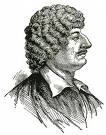
Cherry-ripe. ripe, ripe, I cry,
Full and fair ones; come and buy.
If so be you ask me where
They do grow, I answer: There
Where my Julia’s lips do smile;
There’s a land, or cherry-isle,
Whose plantations fully show
All the year where cherries grow.
1648
[ODQ]

‘Yet them no prince nor peer can buy, till cherry-ripe themselves do cry’
See previous note
From The Garden – Thomas Campion
ODQ states ‘The Fourth Book of Airs’ (c1617) music by Richard Alison who published the song in ‘An Hour’s Recreation in Music’ (1606)

‘There was a laughing devil in his sneer.’

The Corsair – Lord Byron (1788 – 1824)
Canto 1 Stanza 9
There was a laughing devil in his sneer,
That raised emotions both of rage and fear;
And where his frown of hatred darkly fell,
Hope withering fled, and Mercy sighed farewell!
ODQ (1814)

Midas
Midas, a king of Phrygia, who, having hospitably entertained Silenus, the tutor of Bacchus, when he had last his way, was permitted by the god to choose his recompense. He asked that whatever he touched might be turned to gold. His prayer was granted, but when he found that the very meat he attempted to eat became gold in his mouth, he entreated Bacchus to relieve him of the gift. On another occasion Midas declared that Pan was a superior flute player to Apollo, whereupon the offended god changed his ears to those of an ass, to indicate his stupidity. This Midas attempted to conceal; but one of his servants saw the length of his ears and whispered the fact to some reads, and these, whenever agitated by the wind, repeated it to the world.
Also a prose play by Lyly (1592) on the legend.
[CODEL]

‘ungodly mansion’
No reference found for ‘ungoldly mansion’ except inexplicit reference s to Hollywood in 1930’s.
Cruden’s Complete Concordance to the Holy Bible [C]

‘Good Samaritan’
New Testament
Luke Chapter 10 Verses 25 -37
25 And, behold, a certain lawyer stood up, and tempted him, saying Master, what shall I do to inherit eternal life?
26 He said unto him, What is written in the law, how readest thou?
27 And he answering said, Thou shalt love the Lord thy God with all thy heart, and with all thy soul, and with all thy strength, and with all thy mind; and thy neighbour as thyself.
28 And he said to him, Thou hast answered right: this do, and thou shalt live.
29 But he, willing to justify himself, said unto Jesus, And who is my neighbour?
30 And Jesus answering said, A certain man went down from Jersulalem to Jericho, and fell among thieves, which stripped him of his raiment, and wounded him, and departed, leaving him half dead.
31 And by chance there came down a certain priest that way, and when he saw him, he passed by on the other side.
32 And likewise a Levite, when he was at the place, came ad looked on him, and passed by on the other side.
33 But a certain Samaritan, as he journeyed, came where he was: and when he saw him, he had compassion on him,
34 And went to him, and bound up his wounds, pouring in oil and wine, and set him on his own beast, and brought him to an inn, and took care of him.
35 And on the morrow when he departed, he took out two pence, and gave them to the host, and said unto him, Take care of him; and whatsoever thou spendest more, when I come again, I will repay thee.
36 Which now of these three, thinkest thou, was neighbour unto him that fell among the thieves?
37 And he said, He that shewed mercy on him. Then said Jesus unto him, Go, and do thou likewise.

‘The Ungodly’
Old Testament - 13 References
2 Samuel Chapter 22 Verse 5 and Psalm 18 Verse 4
death compassed me, the floods of ungodly men.
2 Chronicles Chapter 19 Verse 2
Shouldest thou help ungodly?
Job Chapter 16 Verse 11; Chapter 34 Verse 18
delivered me to the ungodly.
say to princes, Ye are ungodly?
Psalm 1 Verses 1; 4; 5; 6
in the counsel of the ungodly.
the ungodly are not so.
ungodly stand not in judgement.
but the way of the ungodly shall perish.
Psalm 3 Verse 7
broken the teeth of the ungodly.
Psalm 43 Verse 1
cause against an ungodly nation.
Psalm 73 Verse 12
these are the ungodly who prosper.
Prophets Chapter 16 Verse 27; Chapter 19 Verse 28
an ungodly man diggeth up evil.
an ungodly witness scorneth.
New Testament – 10 References
Romans Chapter 4 Verse 5; Chapter 5 Verse 6
that justifieth the ungodly.
Christ died for the ungodly.
1 Timothy Chapter 1 Verse 9
the law is for the ungodly and.
1 Peter Chapter 4 Verse 18
where shall the ungodly and sinner?
2 Peter Chapter 2 Verse 5; Verse 6; Chapter 3 Verse 7
flood on world of the ungodly.
those who after should live ungodly.
and perdition of ungodly men.
Jude Verse 4; 15; 18
ungodly men turning the grace.
that are ungodly of their ungodly deeds.
walk after their own ungodly lusts.
[C]

‘eaten by frogs’
Psalm 78 Verse 45
He
sent divers sorts of flies among them, which devoured them;
and frogs, which destroyed them.

‘increase delivered to the caterpillar’
Psalm 78 Verse 46
He gave also their increase
unto the caterpillar,
and their labour unto the locust.

 Lady
Hester Lucy Stanhope (1776 – 1839)
Lady
Hester Lucy Stanhope (1776 – 1839)
Eldest child of Charles Stanhope, 3rd Earl Stanhope by his first wife Lady Hester Pitt.
Acted as hostess for her uncle William Pitt from 1803 also acting as his private secretary when he was out of office. Continued with him until he died in 1806 when the Nation awarded her a pension for life of £1200.
Left England to go travelling in 1810 and became famous as an intrepid traveller eventually taking up residence in Syria for the rest of her life.

‘non sequitur’
Latin
A conclusion that does not follow from the premises stated.
Brewers Dictionary of Phrase and Fable [B]

Guy Mannering
 Novel
by Sir Walter Scott (1815)
Novel
by Sir Walter Scott (1815)
The story, laid in the 18C., centres in the fortunes of young Harry Bertram, son of the laird of Ellangowan, who is kidnapped by smugglers when a child, and carried to Holland. This is done at the instigation of Glossin, who has hopes of acquiring on easy terms the Ellangowan estate, in default of an heir male. Bertram ignorant of his parentage, and bearing the name of Brown, goes to India, joins the army, serves with distinction under Colonel Guy Mannering. Bertram (or Brown) is suspected by Mannering of paying attentions to his wife, and is wounded by him in a duel and left for dead. In reality Bertram is in love with Julia, Mannering’s daughter. Recovering from his wound, he follows her to England and the neighbourhood of Ellangowan. Glossin, now in possession of the Ellangowan estate, is alarmed by the return of Bertram and the possibility, that he may learn the secret of his parentage. He plots with Dirk Hatteraick, the smuggler who had originally kidnapped the child, to carry him off once more and make away with him. But an old gipsy, Meg Merrilies, also recognises Harry and devotes all her energies to secure his restoration. She frustrates the plot with the help of Bertram and Dandie Dinmont, a sturdy lowland farmer, but at the sacrifice of her own life. Hatteraick and Glossin are captured, and Hatteraick, after murdering Glossin in prison takes his own life. Bertram is acknowledged and restored to his property and to Mannering’s favour, and marries Julia. The novel not only includes the notable characters of Meg Merrilies and Dandie Dinmont but also that of Dominie Sampson, the uncouth simple-minded tutor of little Harry Bertram.
[CODEL]

‘Quousque tandem abutere, Catalina, patientia nostra?’
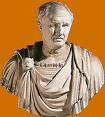 Marcus
Tullius Cicero (106 – 43 BC)
Marcus
Tullius Cicero (106 – 43 BC)
Roman Orator and Statesman
From In Catalinam Speech 1 Chapter 1
How long will you abuse our patience, Cataline?
[ODQ]

‘Non amo te, Sabidi’
Martial (c AD 40 – c AD 104)
Roman epigrammatist, born in Spain
From Epigrammata Book 1 Number 32
Non amo te, Sabidi, nec possum dicere quare:
Hoc tantum possum dicere, non amo te.
I don’t love you, Sabidius, and I can’t tell you why;
all I can tell you is this, that I don’t love you.
 Made
particularly famous as being the reposte of Christ Church, Oxford
undergraduate Thomas Brown to the Dean, Dr John Fell (1625 –
86).
Made
particularly famous as being the reposte of Christ Church, Oxford
undergraduate Thomas Brown to the Dean, Dr John Fell (1625 –
86).
I do not love thee, Dr Fell.
The reason why I cannot tell;
But this I know, and know full well,
I do not love thee, Dr Fell.
[ODQ]

‘Abiit, excessit’
Cicero
From In Catalinam Speech 2 Chapter 1
Abiit, excessit, evasit, erupit.
He departed, he withdrew, he strode off, he broke forth.
[ODQ]

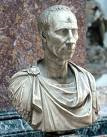 ‘Vae
victis’
‘Vae
victis’
Titus Livius Livy (59 BC –AD 17)
Roman Historian
From Ab Urbe Condita Book 5 Chapter 48 Section 9
Down with the defeated!
cry (already proverbial) of the Gallic King, Brennus, on capturing Rome in 390 BC
[ODQ]

‘labour of Hercules’
 Hercules,
or in Greek Heracles, was the son of Zeus and Alcmena.
Hera’s jealousy of Alcmena extended to her son. She sought to
destroy the infant by sending two serpents to devour him, but he
seized and crushed them in his hands. He became the most valiant and
accomplished of men. After various exploits he married Megara, the
daughter of Creon, but being driven mad by Hera, killed his wife and
children. By direction of an oracle he submitted himself to the
authority of Eurystheus, king of Argos and Mycenae, and at the order
of the latter undertook a number of enterprises, known as the twelve
‘Labours of Hercules’. These were as follows: 1
the
destruction
of the lion of Nemea, which Hercules strangled, and whose skin he
afterwards wore; 2
the destruction of the Lernaean hydra, a creature with many heads,
each of which when cut off gave place to two new ones; 3
the
capture of an incredibly swift stag; 4
the capture of a destructive wild boar; 5
the
cleansing of the stables of Augeas; 6
the destruction of the carnivorous birds near lake Stymphalus; 7
the capture of the Cretan wild bull; 8
the capture of the mares of Diomedes, which fed on human flesh; 9
the obtaining of the girdle of the queen of the Amazons; 10
the destruction of the monster Geryon, king of Gades, and the capture
of his flocks; 11
the obtaining of the apples from the garden of the Hesperides; 12
the bringing from hell of the three-headed dog Cerberus. After his
death he obtained divine honours, having devoted his life to the
benefit of mankind.
Hercules,
or in Greek Heracles, was the son of Zeus and Alcmena.
Hera’s jealousy of Alcmena extended to her son. She sought to
destroy the infant by sending two serpents to devour him, but he
seized and crushed them in his hands. He became the most valiant and
accomplished of men. After various exploits he married Megara, the
daughter of Creon, but being driven mad by Hera, killed his wife and
children. By direction of an oracle he submitted himself to the
authority of Eurystheus, king of Argos and Mycenae, and at the order
of the latter undertook a number of enterprises, known as the twelve
‘Labours of Hercules’. These were as follows: 1
the
destruction
of the lion of Nemea, which Hercules strangled, and whose skin he
afterwards wore; 2
the destruction of the Lernaean hydra, a creature with many heads,
each of which when cut off gave place to two new ones; 3
the
capture of an incredibly swift stag; 4
the capture of a destructive wild boar; 5
the
cleansing of the stables of Augeas; 6
the destruction of the carnivorous birds near lake Stymphalus; 7
the capture of the Cretan wild bull; 8
the capture of the mares of Diomedes, which fed on human flesh; 9
the obtaining of the girdle of the queen of the Amazons; 10
the destruction of the monster Geryon, king of Gades, and the capture
of his flocks; 11
the obtaining of the apples from the garden of the Hesperides; 12
the bringing from hell of the three-headed dog Cerberus. After his
death he obtained divine honours, having devoted his life to the
benefit of mankind.
[CODEL]

‘Dives’
A Latin word meaning ‘rich man’ which occurs in the Vulgate version of the parable of Lazarus (Luke Chapter 16), and has come to be used generically for ‘ rich man’.
[CODEL]

‘sweet mind then speak yourself’
 Ben
Jonson (c1573
-1637)
Ben
Jonson (c1573
-1637)
English Dramatist and Poet
From Eupheme or The Fair Fame Left to Posterity of That Truly Noble Lady, The Lady Lady Venetia Digby, Late Wife of Sir Kenelm Digby, Knt, a Gentleman absolute in all numbers.
Consisting of Ten Pieces
The dedication of her Cradle
The Song of her Descent
The Picture of her Body
Her Mind
Her happy Match
Her being chosen a Muse
Her Fair Office
Her Hopeful Issue
Her Relation to the Saints
Her inspiration or Crowning
From Her Mind;
Sweet Mind, then speak yourself, and say,
As you go on, by what brave way
Our sense you do with Knowledge fill,
And yet remain our wonder still.

‘a beautiful desirable creature’
John Aubrey – Brief Lives

‘Every neighbour will walk with slanders’
Old Testament
Jeremiah Chapter 9 Verse 4
[C]

‘fidus Achates’
‘Fidus Achates’, a friend of Aeneas, whose fidelity has become proverbial.
[CODEL]

‘one sinner destroys much good’
Old Testament
Ecclesiastes Chapter 9 Verse 18
but one sinner destroyeth much good.
[C]

‘Alas, poor Yorick’
William Shakespeare
Hamlet Act 5 Scene I
Hamlet: Alas, poor Yorick. I knew him Horatio; a fellow of infinite jest, of most excellent fancy.

‘Would she could make of me a saint, or I of her a sinner’
William Congreve (1670 -1729)
 English
Dramatist
English
Dramatist
From Pious Selinda Goes to Prayers (song)
Would I were free from this restraint,
Or else had hopes to win her;
Would she could make of me a saint,
Or I of her a sinner.
[ODQ]

‘more childish valourous than manly wise’
 Christopher
Marlowe (1564 – 93)
Christopher
Marlowe (1564 – 93)
English Dramatist and Poet
From Tamberlaine the Great Part 2 Act 4 Scene I
Calyphas: More childish valorous than manly wise.
[ODQ]

‘the parting of the ways’
Old Testament
Ezekiel Chapter 21 Verse 21
the king of Babylon stood at the parting of the ways.
[C]

‘whatsoever a man soweth that shall he reap’
New Testament
Galatians Chapter 6 Verse 7
whatsoever a man soweth that shall he reap.
[C]

‘Learn that the present hour is man’s alone’
Samuel Johnson (1709 – 84)
English poet, critic and lexicographer

‘So sweetly mawkish and so smoothly dull’
 Alexander
Pope (1688 – 1744)
Alexander
Pope (1688 – 1744)
English Poet
From The Duncaid (1742)
Flow Welsted, flow! Like thine inspirer, Beer,
Tho’ stale, not ripe; tho’ thin, yet never clear;
So sweetly mawish, and so smoothly dull;
Heady, not strong; o’erflowing tho’ not full.
[ODQ[

‘he that hath a forward heart findeth no good’
Old Testament
Proverbs Chapter 17 Verse 20
he that hath a forward heart findeth no good.
[C]

‘Admir’d Venetia’
Unable to find any source for this – not John Aubrey on Venetia or Sir Kenelm Digby or Ben Jonson.

‘a beautiful desirable creature’
John Aubrey Brief Lives

‘gods would annihilate but space and time’
Alexander Pope
From Martinus Scriblerus or the Art of Sinking in Poetry Chapter 11 (1727)
Possibly quoting another poet.
Ye Gods! annihilate but space and time,
And make two lovers happy.
[ODQ]

‘Arcadia’
Arcadia, a mountainous district in the Peloponnese, taken as an ideal region of rustic contentment.
[CODEL]

‘parting is such sweet sorrow’
William Shakespeare – Romeo and Juliet
Act 2 Scene II
Juliet: Good-night, good-night! parting is such sweet sorrow
That I shall say good-night till it be morrow.

‘since there’s no help come let us kiss and part’
 Michael
Drayton (1563 – 1631)
Michael
Drayton (1563 – 1631)
English Poet
From Idea (1619) Sonnet 61
Since there’s no help, come let us kiss and part,
Nay, I have done: you get no more of me,
And I am glad, yea glad with all my heart,
That thus o cleanly, I myself can free,
Shake hands for ever, cancel all our vows,
And when we meet at any time again,
Be it not seen in either of our brows,
That we one jot of former love retain.
[ODQ]

‘about the eyelids much sweetness’
John Aubrey – Brief Lives

‘Cuckolds All Awry’

Dance tune from 17C published in John Playford (1623 -86) The English Dancing Master and a ‘top ten’ tune of its time.
To hear it – www.hobbhorsefestival.co.uk/Audio/Cuckolds.html

‘hull cheese’
Strong ale, or rather intoxicating cake, like ‘tipsy cake’ thus described by Taylor, the water poet: ‘It is much like a loafe out of a brewer’s basket; it is composed of two simples – mault and water...........and is cousin-germane to the mightiest ale in England’ (See volume II of Taylor’s Works)
[Brewer]

‘willow cabin at the gate’
William Shakespeare – Twelfth Night
Act 1 Scene 5
Viola: Make me a willow cabin at your gate,
Andcall upon my soul within the house;
Write loyal cantons of condemned love,
And sing them loud even in the dead of night;
Halloo your name to the reverberate hills,
And make the babbling gossip of the air
Cry out, ‘Olivia!’


‘a la Sappho’
Fashionable hair style based on the style of hair seen on the bust of Sappho.

‘a consummation devoutly to be wished’
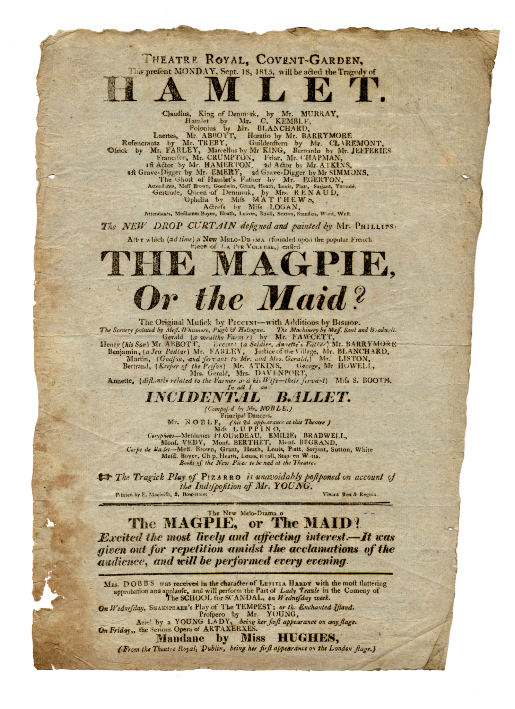 William
Shakespeare – Hamlet
William
Shakespeare – Hamlet
Act 3 Scene 1
Hamlet:
To
be, or not to be: that is the question:
Whether 'tis nobler in
the mind to suffer
The slings and arrows of outrageous
fortune,
Or to take arms against a sea of troubles,
And
by opposing end them? To die: to sleep;
No more; and by a sleep
to say we end
The heart-ache and the thousand natural shocks
That flesh is heir to, 'tis a consummation
Devoutly to be
wish'd. To die, to sleep;
To sleep: perchance to dream: ay,
there's the rub;
For in that sleep of death what dreams may
come
When we have shuffled off this mortal coil,
Must give us
pause:
[ODQ]

‘Oedipus Rex’
Oedipus, son of Laius, king of Thebes, and Jocasta. Laius had brought a curse upon his family and was informed by an oracle that he must perish at his son’s hands, and consequently ordered the destruction of the child. Oedipus was exposed, hung to a tree by a twig passed through his feet (whence his name ‘swollen foot’), but was rescued by a shepherd. Oedipus later slew Laius his father, and and having solved the riddle of the Sphinx, obtained Jocasta, his mother, for his wife, by whom he had two sons, Polyneices and Eteocles, and two daughters, Ismene and Antigone. Having discovered the facts of his parentage, Oedipus, in horror at his crimes, put out his own eyes, while Jocasta hanged herself. He retired, led by his daughter Antigone, to Colonos in Attica, where he died. The story of Oedipus is the theme of one of the tragedies by Sophocles.

[CODEL]

URL: http://heyerlist.org/notes/venetia/annotations.html / Last updated 27 December, 2009